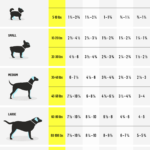Can Dogs Wear Eyeglasses
Can Dogs Wear Eyeglasses? The Surprising Truth about Canine Vision and Eyewear Options
Dogs are beloved companions for millions of people around the world, providing emotional support, physical protection, and endless entertainment. However, dogs also face various challenges in their daily lives, from health issues to social interactions, that require special attention and care from their owners. One of the most intriguing questions that dog lovers may ask is whether dogs can wear eyeglasses, like humans do. While the answer is not as simple as yes or no, this article will explore the fascinating world of canine vision and eyewear options, and provide some insights into how to help your furry friend see better.
Understanding Canine Vision: How Do Dogs See?
Before we dive into the topic of dog glasses, let’s first examine how dogs see the world around them. Unlike humans, who have three types of color receptors in their eyes (red, green, and blue), dogs only have two types (yellow and blue). This means that dogs see the world in shades of yellow and blue, but cannot distinguish between red and green objects. Moreover, dogs have a wider field of view than humans (about 240 degrees compared to 180 degrees), but less visual acuity (about 20/75 compared to 20/20). This means that dogs can see more things at once but cannot see them as clearly as humans can.
Another important difference between human and canine vision is the presence of a reflective layer behind the retina in dogs’ eyes called tapetum lucidum. This layer helps to amplify light entering the eye and improve low-light vision, but also causes some visual distortions such as glare or halo effects. Additionally, dogs have a higher sensitivity to motion than humans due to their larger number of rod cells in the retina.
All these factors combine to create a unique visual experience for dogs that differs from humans in many ways. Dogs can see better in low light, detect motion more easily, and have a wider peripheral vision. However, dogs may struggle with color discrimination, depth perception, and fine details.
Why Would Dogs Need Eyeglasses?
Given these differences between human and canine vision, it’s natural to wonder whether dogs would benefit from wearing eyeglasses. After all, humans wear glasses for various reasons such as correcting refractive errors (nearsightedness, farsightedness, astigmatism), protecting their eyes from UV rays or glare, or enhancing their visual performance in certain tasks (reading, driving, playing sports). Could dogs have similar needs that could be addressed by eyewear?
The answer is yes and no. While dogs do suffer from some vision problems such as cataracts, glaucoma, or retinal diseases that can impair their sight and require medical intervention, most of these conditions cannot be treated with glasses alone. Instead, they may need surgery, medication, or other forms of therapy to address the underlying causes of their eye problems.
However, there are some cases where dogs may benefit from wearing eyewear as a way to protect their eyes from injury or irritation. For example:
– Dogs who work or play in environments with high dust or particles (e.g., construction sites, farms) may benefit from wearing goggles that shield their eyes from debris.
– Dogs who have sensitive eyes due to allergies or dryness may benefit from wearing sunglasses that reduce the amount of UV light entering their eyes and prevent further irritation.
– Dogs who have undergone eye surgery or have eye injuries may need to wear a protective cone or mask that prevents them from scratching or rubbing their eyes and causing further damage.
– Dogs who participate in certain sports or activities such as hunting, agility training, or flyball may wear special glasses that enhance their performance by reducing glare or improving depth perception.
In all these cases, eyewear for dogs serves a practical purpose rather than a cosmetic one. It’s important to note that not all dogs may tolerate wearing glasses or goggles, and some may need time to adjust to them. Additionally, not all types of eyewear are suitable for all breeds or sizes of dogs, so it’s best to consult with a veterinarian or an optometrist who specializes in animal eye care before purchasing any eyewear for your dog.
Eyeglasses for Dogs: What Are the Options?
Assuming that you have a good reason to consider buying eyewear for your dog, what are the options available on the market? Depending on your dog’s needs and preferences, there are several types of glasses or goggles that you can choose from:
– Dog sunglasses: These are similar to human sunglasses but designed specifically for dogs’ faces and eyes. They come in various styles and colors and can provide protection against UV rays, wind, dust, or debris. Some models have adjustable straps or foam padding for a comfortable fit.
– Dog goggles: These are more like swimming goggles but also designed for dogs’ faces and eyes. They usually have wider lenses that cover more of the eye area and can withstand water, sand, or snow. Some models have interchangeable lenses or prescription inserts for dogs who need corrective vision.
– Dog vision aids: These are devices that attach to the head or neck of the dog and provide visual cues or feedback to help them navigate their surroundings better. For example, there are devices that emit ultrasonic sounds when approaching obstacles or vibrating collars that signal the direction of sound sources.
Regardless of which type of eyewear you choose for your dog, it’s important to ensure that it fits well and does not cause discomfort or stress. You should also supervise your dog while wearing glasses or goggles and gradually increase the duration and frequency of use as they get used to them.
Conclusion: Can Dogs Wear Eyeglasses? Yes, But It’s Not Always Necessary or Advisable
In summary, the question of whether dogs can wear eyeglasses has a nuanced answer that depends on the reason for wearing them. While dogs do not have the same visual acuity or color discrimination as humans, most of their vision problems cannot be solved by glasses alone and require medical intervention. However, there are some situations where eyewear for dogs can provide practical benefits such as protection against UV rays, dust, or injury. In these cases, there are various options available on the market such as dog sunglasses, goggles, or vision aids. Regardless of which type you choose for your dog, make sure to consult with a professional and ensure that it fits well and does not cause any harm or discomfort. And don’t forget to take some cute photos of your four-legged fashionista rocking their new shades!



